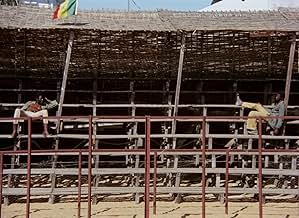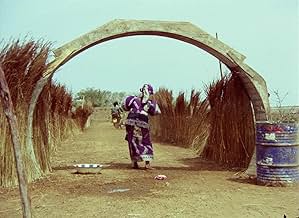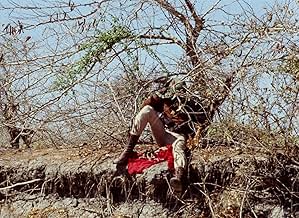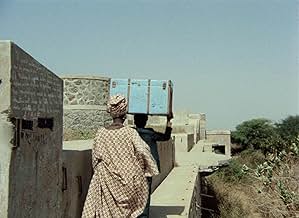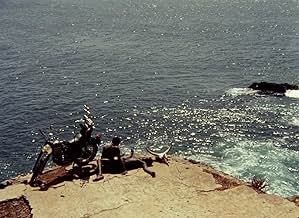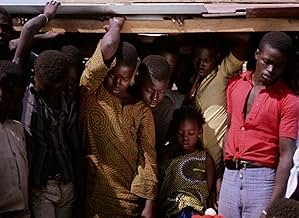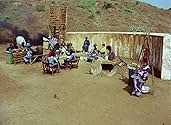NOTE IMDb
7,0/10
4,4 k
MA NOTE
Ajouter une intrigue dans votre langueMory, a cowherd, and Anta, a university student, try to make money in order to go to Paris and leave their boring past behind.Mory, a cowherd, and Anta, a university student, try to make money in order to go to Paris and leave their boring past behind.Mory, a cowherd, and Anta, a university student, try to make money in order to go to Paris and leave their boring past behind.
- Réalisation
- Scénario
- Casting principal
- Récompenses
- 2 victoires et 1 nomination au total
Myriam Niang
- Anta
- (as Mareme Niang)
Josephine Baker
- Joséphine Baker
- (voix)
- (as Joséphine Baker)
Avis à la une
Disorienting and at times even a bit schizophrenic, this is an extraordinarily vibrant, pulsating, and eccentric film. Comparisons to the anarchic, jumpy, free-associative style of the French New Wavers are not far off, but there's something much more erotic and carnal in the film's playfulness.
The story of self-assured college beauty Anta and her fella - Mory the motorcycle-riding herdsman - starts in Dakar and wistfully wanders toward Paris, the seemingly unattainable city of their dreams. Their get-rich-quick schemes and the breezy, colorful manner in which they unfold are funny and inspired.
Along the way, there are sequences of both utter hilarity and genuine depth, although the film does sometimes seem unsure of its many potentially-symbolic representations. But the stylistic narrative and experimental technical aspects are so full of ideas that talk of the film's minor weaknesses seems trivial.
The soundtrack is outstanding, full of syncopation and polyrhythms pacing the film and giving a rich texture to the images. And there's constant movement, until the film's denouement where character, story, camera and concept fuse together in common paralysis, where all seems frozen in reflection.
The story of self-assured college beauty Anta and her fella - Mory the motorcycle-riding herdsman - starts in Dakar and wistfully wanders toward Paris, the seemingly unattainable city of their dreams. Their get-rich-quick schemes and the breezy, colorful manner in which they unfold are funny and inspired.
Along the way, there are sequences of both utter hilarity and genuine depth, although the film does sometimes seem unsure of its many potentially-symbolic representations. But the stylistic narrative and experimental technical aspects are so full of ideas that talk of the film's minor weaknesses seems trivial.
The soundtrack is outstanding, full of syncopation and polyrhythms pacing the film and giving a rich texture to the images. And there's constant movement, until the film's denouement where character, story, camera and concept fuse together in common paralysis, where all seems frozen in reflection.
First, I didn't like the movie because I felt I wasn't able to enjoy it really. It made the impression of a TV documentary on how livestock is mistreated in Western Africa.
Then, by quite confusingly repeating a scene scored by somewhat mystical pop music, the film turned to the other extreme and made me consider it over-sybolistic.
Then, finally, the actual story began, and I could figure out various things. I could separate dream from reality, although this was not so easy, and I thought the film was too clichéd at some moments (e. g. the fat gay man, who was charming but a little camp).
Now that the film is over and I thought back to it I believe it is not at all a bad movie. Many discontinuities and an unusual narrative style are something we should welcome. Regarding the images and colours it is a wonderful piece of work. The film seems like brilliant illustration of an average story.
Then, by quite confusingly repeating a scene scored by somewhat mystical pop music, the film turned to the other extreme and made me consider it over-sybolistic.
Then, finally, the actual story began, and I could figure out various things. I could separate dream from reality, although this was not so easy, and I thought the film was too clichéd at some moments (e. g. the fat gay man, who was charming but a little camp).
Now that the film is over and I thought back to it I believe it is not at all a bad movie. Many discontinuities and an unusual narrative style are something we should welcome. Regarding the images and colours it is a wonderful piece of work. The film seems like brilliant illustration of an average story.
I recently showed this film to a group of students so what follows is a condensed version of the worksheet I gave them. The questions I give hopefully can assist others in making meaning from the film.
Touki Bouki can best be made sense of in the following way: It operates through allusion and symbolism. Through the story of two young lovers, Mory and Fanta, clashing with the older generation, yearning to leave for Paris, Mambety puts on screen his vision of a country where the weight of thousands of years of tradition collides head on with the modernity of a newly emergent Senegal.
Allusion...an implied or indirect reference hinting at something
Symbol...something that stands for something else...something concrete that represents or suggests another thing that cannot in itself be represented or visualised...for example a lion symbolises courage
Think about what you have seen (and heard!) in the film, paying special attention to:
Mory's motorbike – what is it decorated with? What do those objects remind you of? Fanta ties it to a tree, in the midst of a herd of cows...is there a connection to the cows?
The long scene in the first half of the film, when there are lots of shots of the sea, then we see Mory and Fanta together on the cliffs talking about leaving for France
The transformation of the Aunt from an unsympathetic character in the first half of the film to a praise singer in the second.
Charlie's car which Mory and Fanta ride off in after robbing him is a Citroen painted in the flag of which country? How is it positioned in relation to the motorbike and the welcomers?
1. How do you think the following things are alluded to in the film?
The act of lovemaking The city of Paris The cycles of life – birth, death, birth
2. How do you think the following things are symbolised in the film?
African tradition African modernity – this film is made soon after Senegal gained independence The ties which hold us, such as family, friends, our familiar environment Colonial power The primitive
Other points to consider...
Mambety inserts documentary footage from actual events, such as the women at the well, a wrestling competition, street children and a Presidential motorcade, into a fiction film. Do these scenes have anything to do with the story? What effect do they have on you, the viewer? What's your response to them? Why might they be in the film?
Certain images and sounds are repeated in the film, such as the ocean, the crows, the cries of the taxi driver who runs away from the box then repeated by the caveman. What effect does this have? Does it 'organize' the film in any way?
Answers... Mory's motorbike symbolizes Africa, in the scene after they ve robbed Charlie, it s positioned in such a way against the Citroen that the two seem oppositional. The Citroen is a French car decorated with the US flag stars and stripes so representing both French colonialism and US imperialism. The sea is a symbol for lovemaking. The cycles of nature are implied in the scenes of cattle slaughter and goat being sacrificed. Fanta ties the motorbike up as if shes trying to hold at bay the forces of modernity, of change. is the film trying to reconcile two opposing aspects, yearning for the past and tradition while simultaneously embracing modernity, the new? Whose the weird, white looking caveman up in the tree? Its as if Mambety shoves our images of 'primitive' Africans back in faces, also in the dream sequence when Mory and Fanta sit in the car, dressed in 1930s clothes smoking, being sung praises by Aminata Fal is a parody of successful Europeans. There's so much I d love to write about this film...Paris is reduced to a notion, an idea, a fantasy, brought to life through a clichéd song by Josephine Baker. On another level I read Touki Bouki as being about how Europe positions Africa and Africa positions Europe as exotic other. I m running out of space here, loads I could write about this film, hope this is useful, ENJOY!
Touki Bouki can best be made sense of in the following way: It operates through allusion and symbolism. Through the story of two young lovers, Mory and Fanta, clashing with the older generation, yearning to leave for Paris, Mambety puts on screen his vision of a country where the weight of thousands of years of tradition collides head on with the modernity of a newly emergent Senegal.
Allusion...an implied or indirect reference hinting at something
Symbol...something that stands for something else...something concrete that represents or suggests another thing that cannot in itself be represented or visualised...for example a lion symbolises courage
Think about what you have seen (and heard!) in the film, paying special attention to:
Mory's motorbike – what is it decorated with? What do those objects remind you of? Fanta ties it to a tree, in the midst of a herd of cows...is there a connection to the cows?
The long scene in the first half of the film, when there are lots of shots of the sea, then we see Mory and Fanta together on the cliffs talking about leaving for France
The transformation of the Aunt from an unsympathetic character in the first half of the film to a praise singer in the second.
Charlie's car which Mory and Fanta ride off in after robbing him is a Citroen painted in the flag of which country? How is it positioned in relation to the motorbike and the welcomers?
1. How do you think the following things are alluded to in the film?
The act of lovemaking The city of Paris The cycles of life – birth, death, birth
2. How do you think the following things are symbolised in the film?
African tradition African modernity – this film is made soon after Senegal gained independence The ties which hold us, such as family, friends, our familiar environment Colonial power The primitive
Other points to consider...
Mambety inserts documentary footage from actual events, such as the women at the well, a wrestling competition, street children and a Presidential motorcade, into a fiction film. Do these scenes have anything to do with the story? What effect do they have on you, the viewer? What's your response to them? Why might they be in the film?
Certain images and sounds are repeated in the film, such as the ocean, the crows, the cries of the taxi driver who runs away from the box then repeated by the caveman. What effect does this have? Does it 'organize' the film in any way?
Answers... Mory's motorbike symbolizes Africa, in the scene after they ve robbed Charlie, it s positioned in such a way against the Citroen that the two seem oppositional. The Citroen is a French car decorated with the US flag stars and stripes so representing both French colonialism and US imperialism. The sea is a symbol for lovemaking. The cycles of nature are implied in the scenes of cattle slaughter and goat being sacrificed. Fanta ties the motorbike up as if shes trying to hold at bay the forces of modernity, of change. is the film trying to reconcile two opposing aspects, yearning for the past and tradition while simultaneously embracing modernity, the new? Whose the weird, white looking caveman up in the tree? Its as if Mambety shoves our images of 'primitive' Africans back in faces, also in the dream sequence when Mory and Fanta sit in the car, dressed in 1930s clothes smoking, being sung praises by Aminata Fal is a parody of successful Europeans. There's so much I d love to write about this film...Paris is reduced to a notion, an idea, a fantasy, brought to life through a clichéd song by Josephine Baker. On another level I read Touki Bouki as being about how Europe positions Africa and Africa positions Europe as exotic other. I m running out of space here, loads I could write about this film, hope this is useful, ENJOY!
The story to this film is simple (maybe deceptively so), but it's told in an avant-garde way by Mambéty, and loaded with meaning. The premise is that a rebel and a university student have had enough of the traditional life in Dakar, and dream of escaping by ship to Paris. They get on his motorbike which is embellished with cow horns, and to the tune of Josephine Baker crooning "Paris, Paris," begin a series of misadventures on their way to the port.
The events that occur along the road trip, most involving theft or attempted theft, really aren't all that memorable, but the visuals that Mambéty and cinematographer Pap Samba Sow conjured up certainly were. Vibrant colors, rugged scenery, a photographer's eye for framing make for many gorgeous moments, pretty impressive for its limited budget. And yet, in stark contrast to the beauty in this land and its people, life is shown to be dirty, and a struggle. The film felt immersive into Senegal in a literal sense, but through its use of montages, fantasy, and misdirection, also immersive into the fractured mindset of its nonconformist protagonists.
Unfortunately, this immersion also includes some absolutely brutal scenes of animals being killed very early on - cattle in a slaughterhouse, as well as a goat out in a field. These go on for extended intervals, there is a lot of blood, and the animals are shown writhing in agony. Images from the slaughterhouse are reprised towards the end, giving it a larger point, that the young man is as trapped as those poor cows, which was a powerful moment, but I don't think the earlier scenes needed to have been as graphic as they were. It was nauseating to me, though admittedly my perspective is from a different culture, and one lucky enough to have the means to be vegetarian.
The film is made with artistry and style, but it's rooted in realism, and a reflection of the desire for a better life for the Senegalese. There isn't an overt argument made as to the devastating effects of colonialism that impoverished the country, but we do get a glimpse into the ugly attitudes of a French couple who have been teaching in Senegal for seven years, through this exchange:
"There's nothing to see in Senegal. Barren, intellectually as well." "Our salary is three times that of the Senegalese teachers, but they don't eat like we do. They're not as refined." "And what would we buy here? Masks? African art is a joke made up by journalists in need of copy."
Overall, despite its power and visual flair, I confess I admired this film more than I loved it. Aside from the animal slaughter (which may seriously turn you against the film on its own), the events on the road trip following that glorious scene on the flat rock with the sea churning below just weren't strong enough, and pacing was an issue. Worth seeing, just be prepared to avert your gaze in the beginning.
The events that occur along the road trip, most involving theft or attempted theft, really aren't all that memorable, but the visuals that Mambéty and cinematographer Pap Samba Sow conjured up certainly were. Vibrant colors, rugged scenery, a photographer's eye for framing make for many gorgeous moments, pretty impressive for its limited budget. And yet, in stark contrast to the beauty in this land and its people, life is shown to be dirty, and a struggle. The film felt immersive into Senegal in a literal sense, but through its use of montages, fantasy, and misdirection, also immersive into the fractured mindset of its nonconformist protagonists.
Unfortunately, this immersion also includes some absolutely brutal scenes of animals being killed very early on - cattle in a slaughterhouse, as well as a goat out in a field. These go on for extended intervals, there is a lot of blood, and the animals are shown writhing in agony. Images from the slaughterhouse are reprised towards the end, giving it a larger point, that the young man is as trapped as those poor cows, which was a powerful moment, but I don't think the earlier scenes needed to have been as graphic as they were. It was nauseating to me, though admittedly my perspective is from a different culture, and one lucky enough to have the means to be vegetarian.
The film is made with artistry and style, but it's rooted in realism, and a reflection of the desire for a better life for the Senegalese. There isn't an overt argument made as to the devastating effects of colonialism that impoverished the country, but we do get a glimpse into the ugly attitudes of a French couple who have been teaching in Senegal for seven years, through this exchange:
"There's nothing to see in Senegal. Barren, intellectually as well." "Our salary is three times that of the Senegalese teachers, but they don't eat like we do. They're not as refined." "And what would we buy here? Masks? African art is a joke made up by journalists in need of copy."
Overall, despite its power and visual flair, I confess I admired this film more than I loved it. Aside from the animal slaughter (which may seriously turn you against the film on its own), the events on the road trip following that glorious scene on the flat rock with the sea churning below just weren't strong enough, and pacing was an issue. Worth seeing, just be prepared to avert your gaze in the beginning.
Two young people attempt to escape the poverty of their native Senegal and move to Paris. They raise some funds by committing petty crimes.
Touki Bouki is a very distinctive film that's for sure. The African continent hasn't been renowned for producing a great deal of important movies but this one certainly qualifies as such. It has a pretty basic story-line but it's not a plot-driven affair at all really. In actual fact it is quite experimental in approach much of the time and seems to have been influenced by the European New Wave films quite a bit. But what gives it its edge is that within that it is very specifically Senegalese. It's not often we see much from this part of the world represented in cinema, especially not from over forty years ago and certainly rarely from actual Senegalese film-makers. It's this Senegalese colour and authenticity, combined with the bold experimental cinematic presentation that makes this one very much stand out. In truth, I don't think I fully appreciated all its nuances on first viewing and would certainly like to return to it sometime in the future. Be warned though, it does contain some pretty brutal scenes of animal slaughter which make for difficult viewing. All-in-all though, this unusual film has a great deal of character and its strong sense of location makes for fascinating viewing.
Touki Bouki is a very distinctive film that's for sure. The African continent hasn't been renowned for producing a great deal of important movies but this one certainly qualifies as such. It has a pretty basic story-line but it's not a plot-driven affair at all really. In actual fact it is quite experimental in approach much of the time and seems to have been influenced by the European New Wave films quite a bit. But what gives it its edge is that within that it is very specifically Senegalese. It's not often we see much from this part of the world represented in cinema, especially not from over forty years ago and certainly rarely from actual Senegalese film-makers. It's this Senegalese colour and authenticity, combined with the bold experimental cinematic presentation that makes this one very much stand out. In truth, I don't think I fully appreciated all its nuances on first viewing and would certainly like to return to it sometime in the future. Be warned though, it does contain some pretty brutal scenes of animal slaughter which make for difficult viewing. All-in-all though, this unusual film has a great deal of character and its strong sense of location makes for fascinating viewing.
Le saviez-vous
- AnecdotesThis film is believed to be Africa's first avant-garde film, although Soleil Ô (1970) could also make this claim.
- ConnexionsFeatured in Caméra d'Afrique (1983)
- Bandes originalesParis, Paris, Paris
(Madrid) (uncredited)
Music by Agustín Lara
Spanish lyrics by Agustín Lara
French lyrics by Georges Tabet
Performed by Josephine Baker
Meilleurs choix
Connectez-vous pour évaluer et suivre la liste de favoris afin de recevoir des recommandations personnalisées
- How long is Touki Bouki?Alimenté par Alexa
Détails
Box-office
- Montant brut mondial
- 180 $US
- Durée1 heure 25 minutes
- Mixage
- Rapport de forme
- 1.37 : 1
Contribuer à cette page
Suggérer une modification ou ajouter du contenu manquant

Lacune principale
By what name was Touki Bouki (1973) officially released in Canada in English?
Répondre
